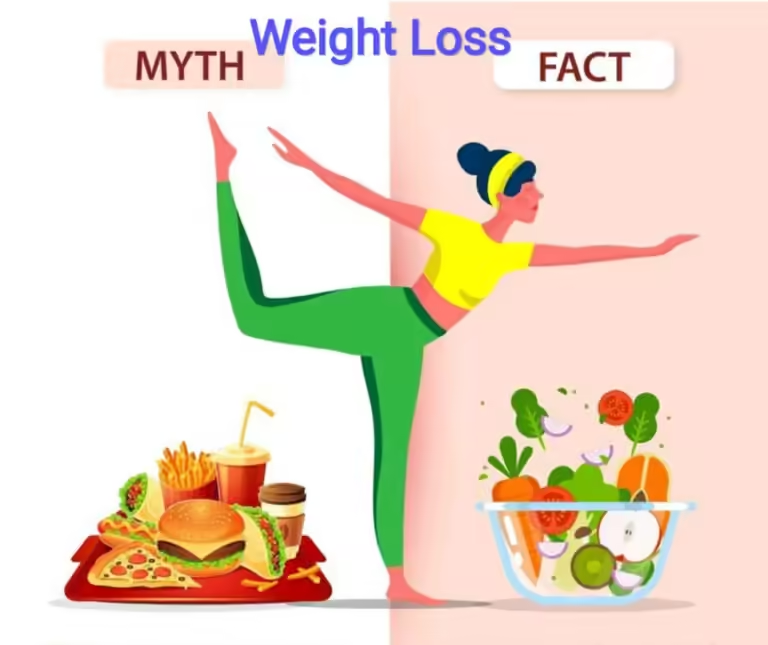Table of Contents
Toggle
In the world of weight loss, separating fact from fiction can be challenging. Misinformation often overshadows proven strategies, leading people to make choices that can hinder progress or even be harmful. In this post, we will dive into some popular weight loss myths and facts to clarify what really works.
Myth 1: “Carbs Are the Enemy for Weight Loss”

Fact: One of the biggest weight loss myths and facts people misunderstand is the role of carbohydrates. Carbs have gotten a bad rap, especially with the popularity of diets like keto. Yet, not all carbs are created equal. Complex carbs like whole grains, vegetables, and legumes offer energy and are essential for overall health. They help with satiety, which can actually prevent overeating.
The truth is that cutting out all carbs is neither sustainable nor necessary for weight loss. Instead, focus on limiting refined carbs like sugary snacks and processed foods. These can spike blood sugar and lead to cravings.
Myth 2: “Skipping Meals Helps You Lose Weight Faster”

Fact: Skipping meals is a classic among weight loss myths and facts. While it may seem logical that eating less would result in weight loss, skipping meals often backfires. When you skip meals, your body goes into a “starvation mode,” slowing down metabolism to conserve energy. This can actually make it harder to lose weight and can lead to overeating later in the day.
Eating regular, balanced meals helps keep stable blood sugar levels and reduces the urge to binge. Small, frequent meals keep your metabolism active and are generally better for sustained energy levels throughout the day.
Myth 3: “Fat-Free Foods Are Healthier”

Fact: The myth that fat-free foods are automatically better is another misconception in weight loss myths and facts. Fat is often removed from foods to lower calorie content. To improve taste, these products are often loaded with added sugars or artificial additives. These ingredients can lead to weight gain, especially if consumed in large amounts.
Healthy fats can aid in weight loss. These fats are found in avocados, nuts, and olive oil. They keep you full and satisfied. Including healthy fats in your diet can help control hunger. They support overall wellness. This makes them a smart choice even when trying to slim down.
Myth 4: “Drinking Water Will Directly Lead to Weight Loss”

Fact: Drinking water alone will not melt away pounds, but staying hydrated is vital in weight loss efforts. This topic often appears in weight loss myths and facts discussions, as people may overestimate water’s impact. While water does not directly cause fat loss, it helps manage hunger and supports metabolism. Drinking a glass of water before meals can reduce appetite and help control portion sizes.
Moreover, water aids in digestion, boosts energy levels, and helps the body metabolize stored fat. For those aiming to lose weight, drinking sufficient water daily is an essential part of a well-rounded strategy.
Myth 5: “Weight Loss is All About Willpower”

Fact: Many believe the myth that sheer willpower is all you need to shed pounds. While determination is important, weight loss is influenced by various factors, including genetics, hormones, and lifestyle. Stress, sleep patterns, and underlying health conditions can all impact weight.
Recognizing the complexity of weight loss can make the journey easier. Setting realistic goals, practicing self-compassion, and seeking support are more sustainable than blaming yourself for occasional setbacks. Weight loss is not a simple matter of willpower; it is a blend of physiological, psychological, and lifestyle adjustments.
Myth 6: “Eating Late at Night Causes Weight Gain”

Fact: The idea that eating after a certain hour causes weight gain is often discussed. It is a common topic in weight loss myths and facts. What truly matters is the quality and quantity of food you consume, not the timing. Eating at night may lead to weight gain only if it results in excess calorie intake. It can also happen if you’re more likely to choose unhealthy snacks.
For many, it is helpful to stick to a routine that aligns with their natural sleep and eating cycles. If you feel hungry at night, choose a light snack with protein. Include fiber to keep you satisfied without overindulging.
Myth 7: “Weight Loss Supplements are a Fast Solution”

Fact: Many people fall for the promise of quick results with supplements. This makes it one of the most common weight loss myths and facts. Despite bold claims, there is limited evidence to suggest that most weight loss supplements offer significant benefits. Some may give minor boosts, but these are no substitute for a balanced diet and regular exercise.
Moreover, many weight loss supplements are not well-regulated and can carry risks. Relying on whole foods and proper nutrition is far more effective and safer for long-term weight management than unproven supplements.
Myth 8: “Doing Tons of Cardio is the Best Way to Lose Weight”

Fact: This idea often arises in weight loss myths and facts conversations. People assume that more cardio equals more fat loss. Cardio exercises like running and cycling burn calories. However, if you rely too much on cardio, it can lead to muscle loss. Additionally, it can cause metabolic slowdown over time.
A balanced approach that combines strength training with cardio is far more effective. Strength training helps build lean muscle, which boosts metabolism and aids in fat loss. Mixing both types of exercise supports sustainable weight loss, improves body composition, and leads to a toned physique.
Myth 9: “You Need to Go on a Strict Diet to Lose Weight”

Fact: Strict diets may promise quick results, but they are difficult to maintain and often lead to yo-yo dieting. Among the weight loss myths and facts, strict diets rank high for being misleading. Instead of drastic calorie cuts or eliminating food groups, make gradual changes. You can sustain these changes in the long term for better effectiveness.
Adopting a balanced diet, including various food groups in moderation, is key to healthy weight loss. Focus on making nutritious choices that fuel your body and are sustainable for your lifestyle.
Myth 10: “Losing Weight is a Linear Process”

Fact: Weight loss is not a straight line; it fluctuates due to factors like water retention, hormonal changes, and muscle gain. Many people find the expectation that weight should consistently drop to be frustrating. This is one of the common myths and facts about weight loss.
It is normal for weight to vary day by day. Focusing on non-scale victories, like increased energy and improved fitness, can help maintain motivation. Remember, patience is crucial in weight loss, and small, consistent efforts lead to sustainable results.
The Takeaway
Understanding the truth behind these weight loss myths and facts gives you power. It allows you to make informed choices on your weight loss journey. Avoiding drastic diets, balancing food intake, and combining cardio with strength training are all strategies backed by science. Staying hydrated, including healthy carbs and fats, and adopting habits you can sustain long-term are more effective than quick-fix solutions.
Weight loss is not about following trends or extremes. It is about creating a balanced lifestyle that aligns with your goals, body type, and personal needs. Stay educated on weight loss myths and facts. This way, you can approach your journey with confidence and clarity. You will set yourself up for lasting success.
FAQs: Weight Loss Myths and Facts
1. Are carbs really bad for weight loss?
No, not all carbs are bad. Complex carbs, such as whole grains, vegetables, and legumes, are essential for energy and satiety. It’s refined carbs, like sugary snacks and processed foods, that can hinder weight loss. Moderating your carb intake rather than eliminating them can be more beneficial.
2. Will skipping meals help me lose weight faster?
Skipping meals is generally counterproductive. It can slow down your metabolism and lead to overeating later in the day. Eating balanced, regular meals helps keep blood sugar levels stable and prevents binge eating.
3. Do fat-free foods help with weight loss?
Not necessarily. Fat-free products are often loaded with extra sugar and additives to improve taste, which can lead to weight gain. Healthy fats, like those in avocados and nuts, are beneficial and can actually help control hunger.
4. Does drinking water directly cause weight loss?
Water does not directly burn fat, but staying hydrated can help manage hunger, reduce calorie intake, and support metabolism. Drinking water before meals can help control portions, making it a helpful part of a weight loss plan.
5. Is weight loss purely about willpower?
No, weight loss is influenced by many factors, including hormones, genetics, stress levels, and lifestyle habits. While determination helps, successful weight loss also requires understanding your body’s unique needs and addressing factors beyond willpower alone.
6. Will eating late at night make me gain weight?
Eating late only contributes to weight gain if it results in excess calorie intake. The type and amount of food you consume are more important than timing. Opt for lighter, nutrient-dense snacks at night if you’re hungry.
7. Are weight loss supplements safe and effective?
Most weight loss supplements lack substantial scientific evidence and can carry health risks. Instead of relying on supplements, focus on a balanced diet and regular exercise, which are safer and more effective for sustainable weight loss.
8. Is cardio the best way to lose weight?
Cardio alone is not the most effective method. Combining cardio with strength training helps build lean muscle, which boosts metabolism and promotes fat loss. A balanced workout routine is better for long-term results.
9. Do I need a strict diet to lose weight?
Strict diets often lead to short-term results and can be difficult to maintain. Instead, make gradual, sustainable changes to your eating habits that you can stick with long-term. Balanced, nutritious meals work best for healthy weight loss.
10. Why does not my weight drop every day?
Weight fluctuates due to water retention, hormones, and other factors. Consistent weight loss is not linear, and day-to-day variations are normal. Focus on long-term trends and overall health improvements rather than daily scale changes.
Thank you for reading, and remember that slow, steady changes lead to sustainable results.

